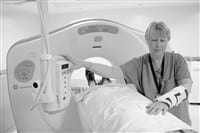Volunteer Chaplains Offer Tips for Hospital Visitors
GREENFIELD — When you have a family member or friend in the hospital, are you ever a bit nervous about visiting, wondering what’s the right thing to say, talk about, or bring along? Baystate Franklin Medical Center volunteer chaplains Susan Bowman, Carolyn Bellany, and John Leary have shared some thoughts on how to make your visit positive and effective.
Generally, the chaplains agree that visitors should try to be a non-anxious presence for the patient. “Your calm manner will be helpful in a time of understandable stress and worry,” said Bowman.
Sometimes, patients don’t want company; they may be tired or too uncomfortable to try to be sociable. “Listen to signals from the patient about whether company is helpful or not,” she recommended. “Be sensitive to what the person needs and wants; shorter visits may be more appropriate and appreciated in many cases.”
Leary reminded visitors to always knock before entering a patient’s room. He added, “let the patient know when you or another family member or friend will be visiting again, or if you won’t be able to visit at a time the patient normally expects to see you. If the patient you are visiting is mobile at all, perhaps you can visit with him in a common area rather than in his room.”
Bellany cautioned visitors to be sure to practice good hand hygiene both before and after visiting patients. “Wash you hands; it’s the best way to stop the spread of germs,” she stated. “Also, be mindful of your choice of gifts — especially food items,” she added, noting that some patients have restricted diets while they are recuperating, and there might not be a good place to store any perishable food items, so save those until the patient returns home.
Bowman advised visitors to practice being good listeners. “Listen to what the person is telling you, even when communication is non-verbal,” she suggested. “Reflect back what the person is telling you instead of putting your own interpretation on what is happening. Sometimes reassurance is warranted. At other times, simply being there and understanding is all that is needed.”
The chaplains stressed that it is important to let staff members do their work without interference, and to only ask questions when staff are not busy with the patient. “If there is a problem, talk with the staff outside the patient’s room, if possible,” Bowman added.
At Baystate Franklin Medical Center, chaplaincy services are available to all patients and their families. Volunteer chaplains are on duty most weekdays; and they are on call for emergencies. Patients can also request visits by spiritual leaders or members of their own faith community. For more information on the hospital’s volunteer chaplaincy program, contact Volunteer Services at (413) 773-2318.

